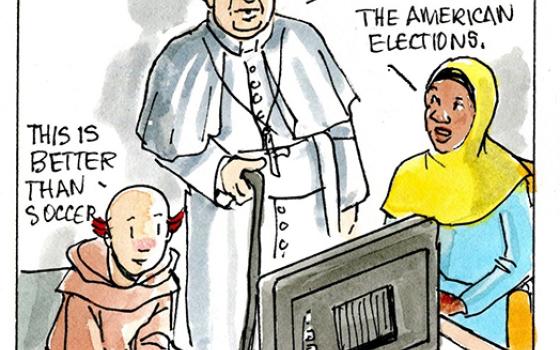
(Pixabay/Hans)
When my wife, Gillian, and I were looking to buy our first home, we toured one that our realtor said would be perfect. The home was recently remodeled by someone our realtor trusted. It had a large yard and was closer to my work.
Touring the home, Gillian and I were impressed. We loved the size of the bedrooms, we loved the newly built deck, and we could easily imagine our son running around the large backyard.
However, the kitchen wasn't big enough to be an eat-in and the living room adjacent to the kitchen could only hold one couch and a television. Seeing this, I asked the homeowner, who was present during our tour, "What is one supposed to do when they eat?"
Laughing, he responded, "Well, who eats at a dinner table anymore?" Surprised by his response, I simply said, "We do."
My wife and I recently had our first child and she was still in graduate school, so we weren't looking for a big home. We also knew we couldn't compromise on what we both consider the most important ritual of our marriage: gathering around the table at the end of the day for dinner. So we didn't end up buying the house.
When we left, I turned to Gillian and said a phrase I often tell anyone who will listen — to friends over drinks, unsuspecting dinner guests and even to college students relegated to my retreat talks.
The phrase goes like this: "Messy table, messy heart. Clean table, clean heart."
As a father, I feel entitled to at least one or two phrases that solicit an eye roll from my family members. Gillian was no exception that day as we left our house showing.
Though it may sound like something one would find in a Martha Stewart book or a phrase of Marie Kondo's from her hit Netflix series, it's not. This phrase comes from a foundational spiritual belief of mine: that the state of one's dinner table is reflective of the state of one's life.
The more items we place on our table and the less we use it, the more chaos there is in our lives. Yet, the cleaner we keep our table and, more importantly, the more we use it, the more balance we find in our lives.
While I'm sure Martha Stewart and Marie Kondo would agree with me, it's actually Henri Nouwen from whom I draw my inspiration. He calls the dinner table "one of the most intimate places in our lives." Not because of the table, but because of what we do at the table.
"Strange as it may sound," Nouwen says, "the table is the place where we want to become food for one another. Every breakfast, lunch, or dinner can become a time of growing communion with one another."
The table, to draw a phrase from the Second Vatican II document Lumen Gentium, is the altar of the "domestic church." (11) Though seemingly elusive, gathering around the table is the first lesson of faith we give to our children.
Before they learn how to pray the Hail Mary, read the Bible or understand what is happening at Mass, they learn about the ritual of a meal. They learn that families gather for a meal at a particular place, to be together, to pray together and to celebrate with one another. Eating at the table is the foundational spiritual practice of family life.
Advertisement
If I sound like I'm repeating myself, that's because I wrote something similar in an article for NCR titled, "Would Jesus invite President Trump to a steak dinner?"As the millennials would say, talking about eating at tables is very "on-brand" for me.
Nevertheless, it's ironic then that during the Christmas season when families gathered around tables to celebrate the coming of Christ — or, perhaps more accurately, the coming of gifts from department stores — our government was shut down due to a venomous disagreement about who belongs at the American table.
As I reflected on this during this month-long government shutdown, I couldn't help but wonder, "Is this because no one eats at a dinner table anymore?"
And before one dismisses this question as oversimplifying a complex issue, consider that our president, the champion of the shutdown, recently welcomed the college football national champions — some of the most physically fit men in sports — to the White House and offered them a room full of fast food. "Great American food," President Trump remarked to reporters.
Indeed, great American food specifically designed to cater to busy families unable to gather around the table at home for dinner. With our President, who should be the moral leader of our nation, championing this kind of food should anyone be surprised that we've forgotten what it means to grow in communion with one another?
In this culture fueled by individualism and consumerism, shutdowns and walls, I think it's time we have a renewed conversation about the value of gathering together around a table to share a meal, and I firmly believe some sixth-century wisdom will guide the way.
In his rule to monks, St. Benedict understood well the deep and intertwined relationship between food and communion.
He encouraged his monks to avoid eating alone as much as possible, telling them that when they leave the monastery for business and expect to return on the same day, they should not eat food outside the monastery. He also passionately encouraged his monks to avoid excess in food or drink.
But most importantly, he made a provision that the superior may break his fast on the account of a guest, for St. Benedict said: "Let all guests arriving at the monastery be received as Christ Himself, for He will one day say, 'I was a stranger and you took Me in.' And let due honor be paid to all, especially, however, to those who are of the household of the faith — and to strangers."
St. Benedict encouraged his monks to have a seat open at the table and the spot cleared, ready for use at all times because you never know when you might entertain angels. That's certainly something we could all practice more in our homes and in our country.
It was at the table that Jesus sought total communion with us by giving us his very self to eat and drink. But it's only through fidelity to the practice of eating together at a clean table that we can fully discover God living in our hearts and in the hearts of our brothers and sisters — most especially in the hearts of the strangers at our borders hoping to be taken in.
[Christian Mocek is the director of annual giving at St. Meinrad, a Benedictine monastery, seminary and school of theology. He lives in New Albany, Indiana, with his wife and son.]
Editor's note: We can send you a newsletter every time a Young Voices column is posted to NCRonline.org. Go to this page and follow directions: Newsletter sign-up.








